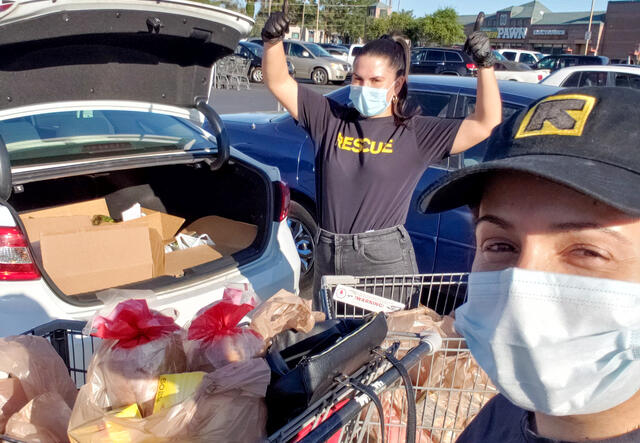
How to help refugees in the U.S. during the coronavirus pandemic
From sewing masks to contacting Congress, here are six ways Americans can help in their own communities.

From sewing masks to contacting Congress, here are six ways Americans can help in their own communities.
Even as we practice social distancing to keep safe, many of us are eager to reach out and help others. The IRC’s 25 offices across the United States offer a great opportunity to do just that.
We’ve transitioned to serving clients mostly remotely, but our staff continue to work just as hard to make sure refugees and other vulnerable communities have the resources they need to weather the pandemic—and you can help.
Below are six ways you can join the IRC from your own home to support refugees and other vulnerable communities across the U.S. You can search for specific volunteer opportunities in your community here.
Monetary donations allow us to direct funds where they are most needed. IRC offices across the country have launched emergency funding drives to help newly arrived refugees, asylees, unaccompanied children, and other groups. You can donate directly to the IRC office nearest your community by finding it here or make a donation that will be used wherever it is needed by clicking here.
Contributions to your local office's emergency response will immediately be deployed to help families in your backyard, many of whom now find themselves unable to work (Many refugees and asylees work in restaurants and hotels, so were among the first to lose their jobs; a number of newly arrived refugees don’t qualify for unemployment benefits). Offices have reached out to current and former clients in an effort to find out what they need; our staff in Salt Lake City called over 500 families! Food is high on the list of needs, and the IRC offices in Dallas, Phoenix and other cities have used their New Roots gardens to provide families with fresh, healthy food during this difficult time.
While monetary donations are the best way to help IRC offices get funds where the need is greatest, some of our offices are also asking supporters to purchase items for emergency kits, including diapers, dish soap, and toothpaste. You can also purchase Amazon, MasterCard, or Visa gift cards that give clients the flexibility to purchase items for themselves. Check out the office near you to find out your community’s specific needs.

The Center for Disease Control now recommends that all people wear masks when in public spaces and some states require them when social distancing is not possible.
Unfortunately, many refugee families do not have access to masks or the tools to make them. IRC offices across the country, including those in Tucson, Salt Lake City, Phoenix, and Los Angeles, are asking people to donate material, or to help make reusable cloth masks. As with any volunteer activity, you can find out if the IRC office near you needs help by clicking here.
If you need masks yourself, why not order from a refugee entrepreneur? The IRC’s Phoenix office has shared the phone numbers of several enterprising refugees in their community from whom locals can order much-needed masks, and other offices (including Salt Lake City and San Diego) have shared the stories of refugee business owners in their communities.
In addition to refugees, immigrant families are among the populations hardest hit by COVID-19. They are also an integral part of the response: 17 percent of the nation’s entire health care workforce is made up of immigrants. But despite their contributions, some immigrant communities have been left out of federal relief packages.
COVID-19 does not discriminate and neither should U.S. policies that seek to combat its spread. Call your senators today and ask them to ensure that immigrants and refugees are included in all pandemic recovery measures.
In the past several weeks, the IRC team in Silver Spring, Md, has called over 40 students and families enrolled in its youth programs. The team reports that certain concerns were on the students’ minds: “I don’t know how to do my homework online,” they say, or “I’m so bored, when can we go back to school?”
To help students with the sudden and difficult task of continuing their education remotely, the office launched one of the many online tutoring programs IRC offices are currently running. To see if an IRC office near you has a tutoring program, you can click here (If you live in Silver Spring, information on how to get involved is here). IRC offices also have opportunities to tutor adults not only in English, but also in digital or financial literacy.

IRC clients come from all over the world and speak languages ranging from Spanish to Swahili, Arabic to Russian.
IRC offices across the country have translated materials to ensure that clients have the information they need. For instance, in late March, the IRC’s office in Boise, Idaho, translated CDC guidance for COVID-19 into 14 languages, and the office continues to offer translations of key information today. Offices have also posted video content in different languages to ensure clients are up-to-date on coronavirus guidance in their area.
Visit the Facebook or rescue.org page for your local office to see if they have up-to-date translations of guidance for your community. Then share those resources to help your neighbors stay safe.